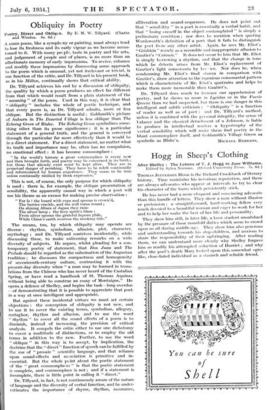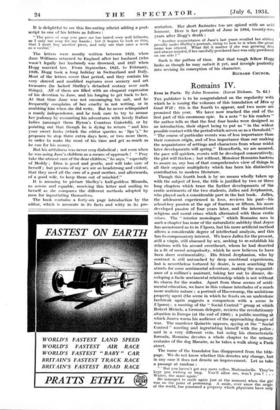Hogg in Sheep's Clothing
Tnosiis JEFFERSON Hoes is the Richard Crookback of literary history. Time maintains his notorious reputation, and there are always advocates who appear at intervals to try to clear his character of the burrs which persistently stick.
He has never had a more eloquent and convincing advocate than this bundle of letters. They show a man without illusion or pretension ; a straightforward, hard-working fellow very much devoted to a beautiful woman and eager to work for her and to help her make the best of her life and personality.
They show him still, in later life, a keen student unsubdued by the pressure of those manifold duties which seem to crowd upon us all during middle-age. They show him also generous and understanding towards his step-children, and anxious to share the responsibility of their upbringing. After reading them, we can understand more clearly why Shelley forgave him so readily his attempted seduction of Harriet ; and why after the poet's death Mary looked upon this somewhat ogre- like, close-fisted individual as a staunch and reliable friend. It is delightful to see this fire-eating atheist adding a post- script to one of his letters as follows : " The piece of soap you gave me has lasted very well hitherto. as I only use soap for my hands ; but it begins to look so thin, that I must buy another piece, and only use that once a week as a cordial."
The letters were mostly written between 1822, when Jane Williams returned to England after her husband (who wasn't legally her husband) was drowned, and 1827 when Hogg married her. From September, 1825, to February, 1828, Hogg took a long holiday in Switzerland and Italy. Most of the letters cover that period, and they contain his very shrewd and modified raptures over scenery and art treasures (he lacked Shelley's detached ecstasy over such things). All of them are filled with an eloquent expression. of his devotion to Jane, and his longing to get back to her. At that time Jane was not encouraging his suit, and he frequently complains of her cruelty in not writing, or in snubbing him when she did write. But he never relinquished a manly independence, and he took care to try to arouse her jealousy by recounting his adventures with lovely Italian ladies (amongst them Byron's Countess Guiccioli), or by pointing out that though he is dying to return " and kiss your sweet limbs (which the editor queries as ' lips ')," he proposes to stop three extra days here, or two more there, in order to make the most of his time and get as much as he can for his money.
But his artfulness was never very diabolical ; not even when he was using Jane's children as a means of approach ! " Pray take the utmost care of the dear children," he says, " especially of Meddy ; Dina is good and gentle, and will take care of herself ; but persons of my sex are so headstrong and violent, that they need all the care of a good mother, and afterwards, of a good wife, to keep them out of mischief."
It is amusing to picture Shelley's half-goddess Miranda, so serene and equable, receiving this letter and smiling to herself as she compares the different methods adopted by men for ingratiating themselves.
The book contains a forty-six page introduction by the editor, which is accurate in its facts and witty in its pre-
sentation. Her. short footnotes too are spiced with an acid humour. Here is her portrait of Jane in 1884, twenty-two years after Hogg's death : " Another acquaintance of Jane's last years recalled her sitting proudly under Shelley's portrait, rising to bow to it when the great name was uttered. What did it matter if she was growing dim and absent-minded, if her carefully powdered face was only powdered on one side ? "
Such is the pathos of time. But that tough fellow Hogg looks as though he may outwit it yet, and inveigle posterity into revising its conception of his character. RICHARD Calmar.











































 Previous page
Previous page